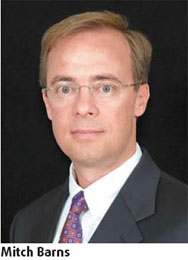

When Mitch Barns took the position as president of Nielsen Greater China at the beginning of this year, he was immediately facing two significant tasks: implementing the new growth strategy in China and providing qualified services for the organizers of the Beijing 2008 Olympic Games.
The company has just formulated its new strategy for its China business development, with integration being one of the key themes.
"We are changing the way our business is structured in China. It used to be a business of different divisions; what we do now is to organize all of it into one big unit," says the 45-year-old American.
He says it is really important to clients, as service integration allows Nielsen to help them in a comprehensive and one-stop way.
He illustrates service integration in a case concerning pricing, because every enterprise is worried about prices given inflation and the rising cost of raw materials.

When a company thinks about pricing and comes to Nielsen, the American global media ratings and consumer consulting company, which has had presence on the mainland for 24 years, will first measure retail sales in supermarkets, hypermarkets and other retail stores all around the country so it can track every brand and each category - how the prices increase over a period of time and which brand or category is increasing faster than others.
Then, depending on Nielsen's consumer survey capabilities, it asks consumers questions such as: "What are your attitudes regarding the price changes of the products you buy right now? Is it causing problems with you or your budget? Are you changing your purchasing behavior?"
"Through these things, we can understand their perspective," says Barns, who started his career at Procter & Gamble, where he spent 12 years in marketing research and brand management and then specialized in survey and consulting services with Nielsen.
According to him, the client may want to know as prices increase, what the impact will be on the brand's sales - if prices increase by 10 percent, will unit sales drop 10 percent or just 5 percent?
"We have advanced modeling experts who work with us very smart people who can build models to predict the impact that a price increase will have on the brand, on the category," says Barns.
"For just one little issue, we can approach it from every direction, every facet, helping our clients understand pricing in the most complete sense," says Barns, adding that the key is integrating all of Nielsen's capabilities and working with the client as one team.
Integrated consulting has become a trend, with many global and domestic giants, such as Euromonitor and Horizon.
Nielsen says it is currently in the process of launching a consumer panel in China to support its work with its clients. There will be 40,000 households in Chinese cities that will scan the bar codes on the products at home for everything they buy. That's an effective tool for the consulting firm to gain a detailed view of the consumer market and offer objective and practical advice to clients.
With its global network in 108 nations and regions, as well as its multinational experiences, Nielsen intends to bring to China anything the firm has in the other parts of the world if it's needed.
After taking the position, Barns stimulated Nielsen's growth on the mainland and currently Nielsen has about 2,000 mainland-based employees, with 400 of them hired during the first six months of this year.
Given its strength in providing market insights around the globe, Nielsen worked with the Beijing Organizing Committee for the Olympic Games (BOCOG) in three areas for about a year. The first was measuring TV audiences/TV ratings in 38 markets around the world, so BOCOG could know the general TV audience trend on a global basis.
The second was periodic consumer measurement. Starting in 2007, Nielsen began fielding consumer surveys in 48 markets, measuring attitudes toward China and the Olympic Games. This allowed BOCOG to measure changes in perceptions before, during and after the Games. Nielsen also conducted surveys of foreign visitors to Beijing outside the Olympic venues. The third measured the Internet audiences in 11 markets around the world so BOCOG could see how online viewing and TV viewing of the Games complemented one another.
BOCOG also signed contracts with other agencies with related services, such as Hill and Knowlton for communications and PriceWaterhouseCoopers for accounting, which was helpful for building their brands in China, analysts say.
Barns says that competition in the consulting market is intense on the mainland, with many international brands and local companies mushrooming.
"The biggest challenge for not only us but also other players is talent," he says. All are competing heavily to hire qualified people, he says. "Our strategy is focusing on hiring, training, developing, and retaining our people," says Barns.
(China Daily 09/22/2008 page7)













